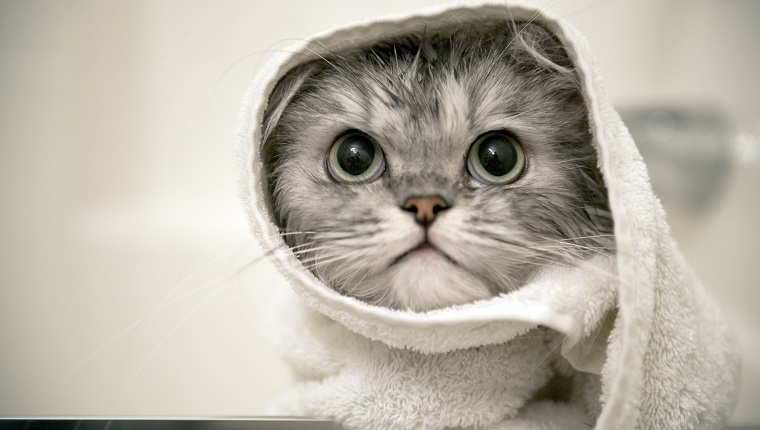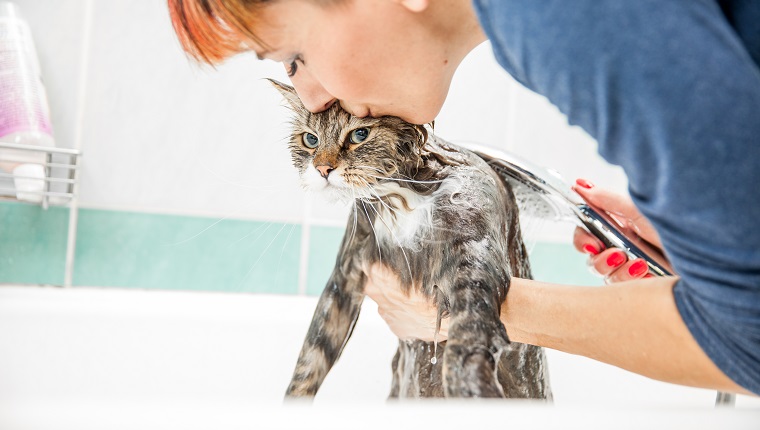Your cat is dirty, and you know they need a bath. Groomers are expensive, and you don’t want to spend the extra cash. Luckily, it’s actually easy to bathe your cat at home, as long as you prepare in advance and keep a few basic things in mind.
Although some breeds like Maine Coons or Turkish Vans love the water, many cats find baths to be a stressful experience. It’s best if you can start bathing your cat young and get them used to it, but even if you have an older cat who has never been bathed, it can be done without trauma to you or the cat.
If your cat is older and has never been bathed, or if you think your cat is going to have a problem with it, it might be best to have a helper.
Prepare everything from the temperature of the water to shampoo and towels ahead of time, and remember to stay calm!
Giving Your Cat A Bath: A Step-by-Step Guide
First, brush the mats and dirt from your cat’s hair. Just like dogs, mats won’t come out if you get them wet.
Remember to use cat specific shampoos, especially if you’re bathing for fleas. Dog flea shampoo can be toxic to your cat, and people shampoos dry out your cat’s skin and can make them itchy and irritable.
When you’ve got all your materials ready, run four to five inches of warm water into your bathtub. Gently place your cat into the tub, and using a cup or hose attachment, wet their body with warm water.
As with dogs, you’ll want to avoid bathing the head area and only focus on the fur from their neck to their tail. After your cat is thoroughly wet, lather the cat’s body with the cat shampoo, making sure to lather their underside as well.
Rinse your cat’s body, again avoiding the head area. Rinse until you can’t feel shampoo in the cat’s hair anymore.
When you’re finished washing, wrap your cat in a towel to absorb the water, and then use another towel to gently dry. Don’t attempt to use a hair dryer on your cat, as the heat is too hot for a cat’s sensitive skin — not to mention the scary sounds!
If your cat has long hair, just use another towel and get them as dry as you can.
Last but not least, be sure to give kitty some treats and praise after the ordeal is over! Cat baths are tough on both cats and their humans, and you’ll want them to associate good feelings with getting baths in the future!
Remember: With a little practice and some preparation, grooming at home can be easier, less stressful, and less costly than taking them to a professional groomer.
Extra Tips To Make Things Easier

It might be a good idea to make sure your cat’s nails are trimmed or at least not sharp before bathing them. Although all efforts should be made to keep the cat calm during their bath, chances are they may become upset and scratch you. Trim their nails ahead of time to protect the sensitive skin on your arms!
Keep soaps, cups and other materials within arm’s distance of where you’ll be bathing your cat
Consider putting a towel in the tub or sink to help give your kitty some grip, this will help reduce their stress level and chance of injury
If your cat has long hair, try diluting the shampoo first before giving them a bath. This will help the shampoo get down to the end of their hair follicles.
FAQs About Cat Baths
Is it okay to give my cat a bath?
Lucky for cat parents, it’s estimated that cats spend anywhere from 30 to 50 percent of their time self grooming. This makes giving them baths usually unnecessary, but that doesn’t mean you’ll never need to give them a bath!
If your cat is a show cat or becomes unreasonably sticky or smelly, it may be time for a bath. Obese cats also have difficulty self grooming due to limited reach and mobility. They may need a bath to reach their lower back and rear areas.
If someone in your home suffers from cat allergies, bathing the cat will help reduce the dander in their fur.
How often should I bathe may cat?
Although there’s no set schedule for cat bathing, your cat probably doesn’t need a bath more than once a month. Any more than that can dry out and irritate her skin.
However, if you have a hairless cat or a cat with a medical condition that prevents them from self-grooming, you’ll need to bathe them more often. You should consult your veterinarian about a bathing schedule for your specific feline friend.
Where should I bathe my cat?
A bathtub can be a great place for a larger or adult cat. Kittens and smaller cats may feel more comfortable in a small tub or a kitchen/bathroom sink.
A skunk sprayed my cat! Help!
If a wayward skunk sprayed your cat, try to give them a bath as quickly as possible. The longer the skunk’s secretions dry on kitty’s skin and fur, the harder the scent will be to remove!
Although commercial sprays and shampoos are available, you can also try this DIY skunk smell solution from our friends at DogTime.
Have you ever had to give your cat a bath? Do you have any tips? Let us know in the comments below!






